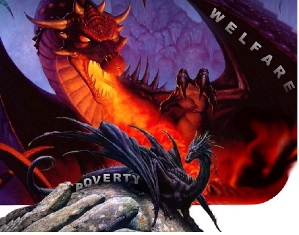 Introduction
Introduction
The issue of poverty in Canada is a subject of vigorous public debate. Several Canadian jurisdictions have announced poverty reduction strategies, and there is pressure on all other governments to do the same.
A common theme in anti-poverty advocacy is to build up the welfare system as a way to reduce poverty.1 I will argue quite a different approach. I will argue that welfare, as it has developed over the last half-century in Canada, has been a detriment to both the poor and to society. I will argue for its demise, through an incremental process that makes welfare less and less necessary, and ultimately dispensable in its present form.
Governments, not lobby groups, should lead this change. It is fashionable at present to involve anti-poverty groups in policy-making, on the grounds that groups that work with the poor know poverty issues best. This is faulty logic. Most such groups have a powerful stake in the status quo. With few exceptions, they have failed to demonstrate a vision of social policy beyond the scope of welfare. The most important stakeholder in an anti-poverty policy is the public, including the low-income public, not those who work in poverty industries.
Welfare undeniably gives money to poor people. It may seem counterintuitive to argue that such a system could play a role in generating and perpetuating poverty. The arguments that follow will, I hope, demonstrate that welfare is, in fact, selfdefeating as an anti-poverty tool.
The central arguments are not complex. Welfare pays people not to work, and we should not be surprised that it creates more of what it pays for. Whereas a rational social policy would encourage economic engagement, welfare has encouraged chronic unemployment and economic marginalization. The welfare model is a failure of vision. It has, over the last half-century, consigned hundreds of thousands of Canadians to a life of diminished well-being, low achievement and diminished happiness.
My solution boils down to a basic premise: Replace policies that buy bad outcomes with programs that buy better outcomes, for the individual and for society. We should, I would argue, set about a systematic displacement of the welfare system in favour of benefits that are better public investments.
My concept of good outcomes is also straightforward. There are obviously those who think the goal of social policy is generous benefits. I disagree. I will argue that a comfortable income from passive welfare benefits is not only unattainable in practice, but also undesirable.
Very few citizens set out toward a life of benefit dependency for themselves or their children. Most plan and work toward an adequate education, a job that provides a decent living standard, respectable status in the community, a home, a family, etc.
These life goals are about connections and achievement, not entitlement to other citizens’ money. They are about people becoming active citizens: productive, selfreliant, contributing to the economy and their communities. I will argue that to expect less for low-income citizens is to curse the poor with low expectations.
In fact, our expectations and aspirations for Canada’s relative poor should be the same as for all citizens. We know that having useful work and a purpose in life are both good and necessary. Our most important social relationship is with the economy because that is how most of us make a living, but at present, too many citizens live outside its bounds. Solving that problem is the real key to reducing poverty.
To break free of the welfare era will require a culture change. The debate about benefit levels is not helpful. We need to use public resources to achieve better life outcomes. My position is that work is good, and any honest work is a good job. Dependent adults who become workers enjoy better economic status and the dignity of becoming taxpayers, and society trades an unnecessarily dependent person for a contributing citizen.
Of course, this is not at all what welfare is about. Welfare emerged in an era when many people thought the only issue was money, and the job of social policy was to give the poor more of it. Welfare, accordingly, developed as a system that treats the poor as if they are passive vessels into which public money is poured in expectation of good outcomes. We now know that this approach does not work, because it matters how we get our money, not just how much we have.
Everyone needs help at some time, but no one is going to escape poverty without some personal effort. One element that is lacking in the welfare legacy—indeed, actively undermined—is personal responsibility. Moving beyond the welfare era in part means restoring personal responsibility to social policy.
The issue of incentives in social policy also needs close attention. I have argued elsewhere that we should view social policy as a behavioural science, albeit one that is in its infancy.2 Incentives and disincentives cannot always predict individual human behaviour, but there is no doubt that in the longer run, governments tend to get the behaviour they pay for in social programs.
Equity and incentive have been competing public policy issues as long as there have been market economies. We have managed this tension poorly in Canada. We have used clumsy, counterproductive methods to transfer wealth from rich to poor, and as a result, we have underutilized human resources and an economically marginalized fraction of our citizenry. Most of our poverty problem is, in fact, policy driven, and that is a good thing in only one sense—what is done by policy can be undone by policy.
View entire study as PDF (36 Pages)


